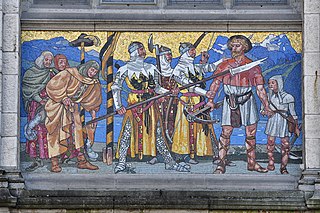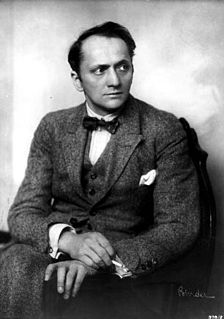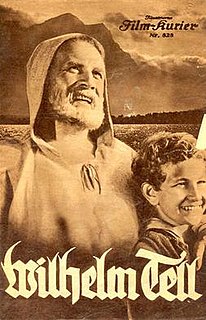Related Research Articles

William Tell is a folk hero of Switzerland. According to the legend, Tell was an expert mountain climber and marksman with a crossbow who assassinated Albrecht Gessler, a tyrannical reeve of the Austrian dukes of the House of Habsburg positioned in Altdorf, in the canton of Uri. Tell's defiance and tyrannicide encouraged the population to open rebellion and a pact against the foreign rulers with neighbouring Schwyz and Unterwalden, marking the foundation of the Swiss Confederacy. Tell was considered the father of the Swiss Confederacy.

Armin Mueller-Stahl is a retired German film actor, painter and author, who also appeared in numerous English-language films since the 1980s. He was nominated for the Academy Award for Best Supporting Actor for his role in Shine. In 2011, he was awarded the Honorary Golden Bear.

Konrad Wolf was an East German film director. He was the son of writer, doctor and diplomat Friedrich Wolf, and the younger brother of Stasi spymaster Markus Wolf. "Koni" was his nickname.

The Rütli Oath is the legendary oath taken at the foundation of the Old Swiss Confederacy by the representatives of the three founding cantons, Uri, Schwyz and Unterwalden, It is named after the site of the oath taking, the Rütli, a meadow above Lake Uri near Seelisberg. Recorded in Swiss historiography from the 15th century, the oath is notably featured in the 19th century play William Tell by Friedrich Schiller.

Theodor August Konrad Loos was a German actor.

The Captain from Köpenick is a 1956 West German film directed by Helmut Käutner and based upon the 1931 play The Captain of Köpenick by Carl Zuckmayer. The play was based on the true story of Wilhelm Voigt, a German impostor who masqueraded as a Prussian military officer in 1906 and became famous as the Captain from Köpenick. It was nominated for the 29th Academy Awards in the category Best Foreign Language Film.

The Last Bridge is a 1954 Austrian-Yugoslavian war drama film directed by Helmut Käutner and starring Maria Schell, Bernhard Wicki and Barbara Rütting. It tells the story of a German nurse who is captured by Yugoslav partisans, and with her devotion to medical duty finds herself with divided loyalty to both sides of the conflict. The film was entered into the 1954 Cannes Film Festival.

Géza von Radványi was a Hungarian film director, cinematographer, producer and writer.

Wir Wunderkinder is a 1958 West German comedy film directed by Kurt Hoffmann and starring Hansjörg Felmy and Robert Graf. The black-and-white film is also known in English as Aren't We Wonderful?.

Eduard Clemens Franz Anna Freiherr von Wangenheim, known as Eduard von Winterstein, was an Austrian-German film actor who appeared in over one hundred fifty German films during the silent and sound eras. He was also a noted theater actor.

William Tell is a 1923 German silent adventure film directed by Rudolf Dworsky and Rudolf Walther-Fein and starring Hans Marr, Conrad Veidt, and Erich Kaiser-Titz. The film portrays the story of the legendary Swiss national hero William Tell. The sets were designed by Rudi Feld.

William Tell is a 1934 German-Swiss historical drama film directed by Heinz Paul and starring Hans Marr, Conrad Veidt and Emmy Göring. It is based on the 1804 play William Tell by Friedrich Schiller about the Swiss folk hero William Tell. It was made in Germany by Terra Film, with a separate English-language version supervised by Manning Haynes also being released. While working on the film Veidt, who had recently given sympathetic performances of Jews in Jew Suss (1934) and The Wandering Jew, was detained by the authorities. It was only after pressure from the British Foreign Office that he was eventually released. It is also known by the alternative title The Legend of William Tell.

Tarot is a 1986 West German drama film directed by Rudolf Thome. It is loosely based on Johann Wolfgang von Goethe's 1809 novel Elective Affinities. It was entered into the 15th Moscow International Film Festival.

The House Order of the Wendish Crown was an Order of the House of Mecklenburg, jointly instituted on 12 May 1864 by Grand Duke Friedrich Franz II of Mecklenburg-Schwerin and Grand Duke Friedrich Wilhelm of Mecklenburg-Strelitz.

The Divine Jetta is a 1937 German musical comedy film directed by Erich Waschneck and starring Grethe Weiser, Viktor de Kowa, and Marina von Ditmar.
Ant Street is a 1995 Austrian comedy film directed by Michael Glawogger. The film was selected as the Austrian entry for the Best Foreign Language Film at the 68th Academy Awards, but was not accepted as a nominee.

Murderer in the Fog is a 1964 West German crime film directed by Eugen York and starring Hansjörg Felmy, Ingmar Zeisberg and Elke Arendt. The police investigate a series of attacks in a small German town.

The Stauffacherin is a Swiss legendary figure. According to Swiss folklore, she was the wife of Werner Stauffacher, the Landammann of the Canton of Schwyz and a founding father of the Old Swiss Confederacy. She was depicted in Friedrich Schiller's 1804 play William Tell as an advisor to her husband, advocating for Swiss independence from Habsburg rule. The image of the Stauffacherin, often viewed as the feminine counterpart to Wilhelm Tell, has become a symbol for Swiss national pride, democracy, and women's suffrage.
References
- ↑ BFI.org
- ↑ "2nd Moscow International Film Festival (1961)". MIFF. Retrieved 2012-11-04.